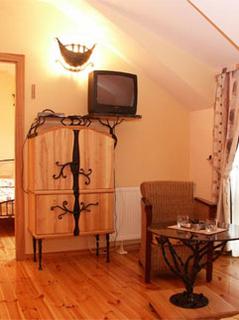Poland has received a dressing down from the European Commission
Published:
20 February 2005 y., Sunday
The EC says Poland needs to be more aggressive with its fiscal adjustment if it wants to enter the eurozone.
The response came after Poland presented an updated version of its convergence program, known as the Hausner plan, after Deputy Prime Minister Jerzy Hausner, that was markedly less ambitious than the original version. It sets out a gradual reduction of the budget deficit from 5.4 percent of GDP in 2004 to 2.2 percent by 2007. In the original plan, the budget deficit was planned to be just 1.5 percent of GDP by 2007.
These new figures are based upon real GDP growth of 4.9 percent on average in 2005 and 2006, down from 5.7 percent in 2004. In 2007 the economy is predicted to rebound with a 5.6 percent growth in GDP, something which analysts remain skeptical about.
In order to meet the criteria for entry to the EU, Poland would have to fully implement the comprehensive measures contained within the Hausner plan. This would mean a 4.7 percent impact on GDP for 2005-2007 and, although Poland has satisfied Brussels that it can correct the budget deficit in the short term, the risky strategy leaves many obstacles to getting the deficit below three percent of GDP by 2009, a key requirement for entering the single currency. EC officials also criticized the government's lack of specific steps to secure a long-term balance of public finances.
However, the Polish government remained resolute in the face of the EC critique. "Poland will enter the eurozone in 2009," Hausner asserted. "The government maintains its convergence plan. I know nothing about any change of the government stance." Addressing the EC, Hausner said: "Your anxiety is understandable, but we do what we think is proper. Stop worrying unnecessarily."
Šaltinis:
Warsaw Business Journal
Copying, publishing, announcing any information from the News.lt portal without written permission of News.lt editorial office is prohibited.
The most popular articles
 On 31 August 2009 in a non-public way AB Bank SNORAS issued the emission of perpetual debt securities included into the bank capital amounting to LTL 72.5 million.
more »
On 31 August 2009 in a non-public way AB Bank SNORAS issued the emission of perpetual debt securities included into the bank capital amounting to LTL 72.5 million.
more »
 The European Commission, through its longstanding cooperation with the US and Canada, announces the launch of 33 new and innovative projects involving universities and training institutions on both sides of the Atlantic.
more »
The European Commission, through its longstanding cooperation with the US and Canada, announces the launch of 33 new and innovative projects involving universities and training institutions on both sides of the Atlantic.
more »
 Today at the VII World Congress on Alternatives and Animal Use in the Life Sciences in Rome, the European Commission and the European cosmetic industry presented their joint financial effort for research into alternative safety testing methods.
more »
Today at the VII World Congress on Alternatives and Animal Use in the Life Sciences in Rome, the European Commission and the European cosmetic industry presented their joint financial effort for research into alternative safety testing methods.
more »
 SEB Bank, the largest bank in Lithuania, invests almost LTL 4.6 million in to the upgrade of its data transmission network.
more »
SEB Bank, the largest bank in Lithuania, invests almost LTL 4.6 million in to the upgrade of its data transmission network.
more »
 The World Bank’s Board of Executive Directors today approved a credit of US$ 36.6 million equivalent of additional financing for the Lifeline Road Improvement Project for Armenia.
more »
The World Bank’s Board of Executive Directors today approved a credit of US$ 36.6 million equivalent of additional financing for the Lifeline Road Improvement Project for Armenia.
more »
 The Executive Board of the International Monetary Fund (IMF) today completed the first review of Latvia's performance under an economic program supported by a 27-month Stand-By Arrangement.
more »
The Executive Board of the International Monetary Fund (IMF) today completed the first review of Latvia's performance under an economic program supported by a 27-month Stand-By Arrangement.
more »
 The Commission has today decided to close the formal investigation procedure into the privatisation and restructuring of Austrian Airlines concluding that the restructuring following its sale to Lufthansa is compatible with community law.
more »
The Commission has today decided to close the formal investigation procedure into the privatisation and restructuring of Austrian Airlines concluding that the restructuring following its sale to Lufthansa is compatible with community law.
more »
 Ben Bernanke's reappointment as head of the Federal Reserve did not come as a surprise, but Wall Street still responded with the proverbial thumbs up.
more »
Ben Bernanke's reappointment as head of the Federal Reserve did not come as a surprise, but Wall Street still responded with the proverbial thumbs up.
more »
 Over I half-year 2009 accommodation establishments had by 22 per cent less guests.
more »
Over I half-year 2009 accommodation establishments had by 22 per cent less guests.
more »
 In the first such transaction in Russia, carbon credits generated by utilising gas which would otherwise be flared at an oilfield in eastern Siberia are to be purchased through a carbon fund set up by the EBRD and the European Investment Bank (EIB), the Multilateral Carbon Credit Fund (MCCF).
more »
In the first such transaction in Russia, carbon credits generated by utilising gas which would otherwise be flared at an oilfield in eastern Siberia are to be purchased through a carbon fund set up by the EBRD and the European Investment Bank (EIB), the Multilateral Carbon Credit Fund (MCCF).
more »